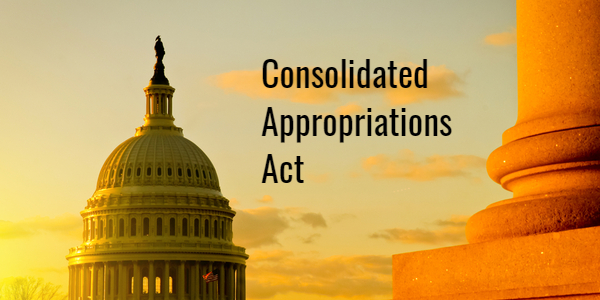On December 27, 2020, President Trump signed the Consolidated Appropriations Act, 2021 (“CAA”) into law. The CAA contains both the COVID-Related Tax Relief Act of 2020 (COVIDTRA) and the Taxpayer Certainty and Disaster Tax Relief Act of 2020 (TCDTR). In addition to providing for stimulus payments of $600 per taxpayer and qualifying child, the CAA also contains numerous tax provisions and extenders.
Individual Provisions
Increased deduction for medical expenses – The CAA permanently decreases the limitation for deducting medical expenses to 7.5% of adjusted gross income (“AGI”). Previous law only allowed for a deduction of medical expenses in excess of 10% of AGI.
Child Tax Credit & Earned Income Credit (“CTC” & “EIC”) – The CAA allows individuals to use their earned income from 2019, if greater, to calculate their CTC & EIC for 2020.
Charitable contributions for taxpayers who do not itemize deductions – The CARES act, passed earlier in 2020, created a new above-the-line deduction for charitable contributions made in 2020 for taxpayers who do not itemize deductions. The maximum allowable deduction is $300 ($600 for a married couple). The CAA extends this rule through 2021.
Income limitations for charitable contributions – Under previous law, charitable contributions to qualified organizations were generally limited to 60% of a taxpayer’s AGI. The CARES act removed the limitation for 2020; the new Act also removes the limitation for 2021.
Education credits – The CAA removes the above the line deduction for tuition and fees in exchange for an expanded application of the Lifetime Learning credit. This applies to tax years 2021 and beyond.
Exclusion from income for forgiveness of qualified principal residence indebtedness – Forgiveness of debt is generally included in taxable income. An exception applied for forgiveness of debt that was used to acquire a personal residence. The maximum which could be excluded was $2 million for a married couple. This provision was set to expire in 2020. The CAA extends this exclusion through 2025, but at a reduced amount of $750,000.
Mortgage insurance premiums – The CAA extends the deduction for qualified mortgage insurance premiums through 2021.
Retirement plan distributions – The CAA allows for distributions from retirement plans of up to $100,000 without being subject to the 10% penalty that applies to early retirement distributions. The distribution, however, will be subject to income tax over a 3-year period. This extends the relief provided in the CARES Act & expands the eligibility to all taxpayers.
Payroll Provisions
FSA Plans – Employers may choose to allow a carryover of unused funds from 2020 to 2021 and from 2021 to 2022 or to extend the grace period for spending unused FSA funds to 12 months after the plan year.
Extension of Families First Coronavirus Response Act (“FFCRA”) credits for paid sick and family leave – The FFCRA, passed earlier in 2020, provided employers a payroll tax credit for paid sick and family leave due to COVID-19. The Act extends this credit through March 31, 2021.
Employer tax credit for paid family and medical leave – Earlier tax law allowed businesses to claim a general business credit for paid family and medical leave up to 12 weeks per year. The provision was set to expire at the end of 2020; the Act extends this credit through 2025.
Work opportunity credit – The work opportunity credit is available to employers for hiring individuals from certain targeted groups. The credit was set to expire at the end of 2020. The CAA extends the credit through 2025.
Expansion of Employee Retention Credit (“ERC”) – The CARES Act provided a 50% credit for companies who continued to pay their employees during a COVID-19 imposed lockdown. The CAA expands eligibility for the ERC, increases the credit to 70%, and extends the credit through June 30, 2021.
Extension of deferred payroll taxes – President Trump signed an executive memorandum in August 2020 allowing employers to defer the employee’s share of social security taxes between September 1, 2020 and December 31, 2020. The taxes were required to be repaid through a reduction in the employee’s pay between January 1, 2021 and April 30, 2021. The CAA extends the required repayment period to December 31, 2021.
Employer payment of student loans – The CAA extends the current CARES act provision which allows employers to repay education loans incurred by their employees, which was set to expire at the end of 2020. The CAA extends the provision to 2025. The maximum annual payment is $5,250.
Business Tax Provisions
Deductions for expenses paid using PPP loan proceeds – The CAA clarifies the original intention of the PPP loan program and allows for full deduction of any expense paid for using PPP loan proceeds.
Bringing back the business lunch – The CAA temporarily allows for a full 100% deduction for meals provided by restaurants that are paid or incurred in 2021 or 2022.
Qualified disaster relief contributions – The CAA creates a new category of “qualified disaster relief contributions” for qualifying contributions made to organizations for disaster relief efforts. Contributions must be made between January 1, 2020 and 60 days after passage of the Act. Corporations could receive a deduction of up to 100% of taxable income.
Accelerated depreciation of residential rental property for electing real property trade or business – Real property trades or businesses subject to the interest expense limitations of 163(j) may choose to make an election. Under the election, the interest limitations will not apply; however, the taxpayer must use ADS depreciation rules resulting in a longer useful life and lower depreciation expense each year. Under prior law, residential rental property placed in service prior to January 1, 2018 was subject to a 40-year ADS useful life. The CAA changes this to a 30-year ADS useful life if the taxpayer was not subject to ADS prior to January 1, 2018.
MKG Tax Consultants
4021 N Fresno Street #107| Fresno, CA 93726
Phone (559) 412-7248 Fax (609) 756-3766
Toll-Free 1-866-675-3933
website: https://mkgtax.wpengine.com

